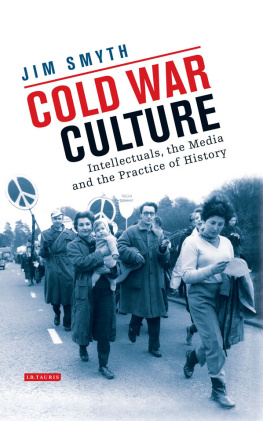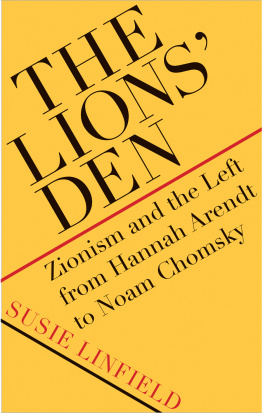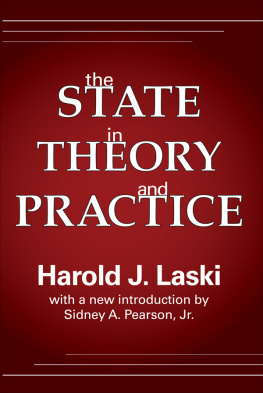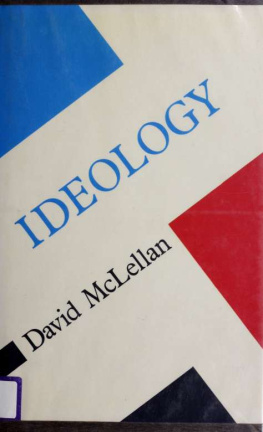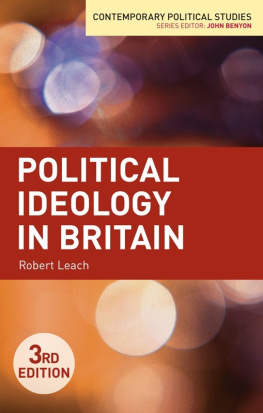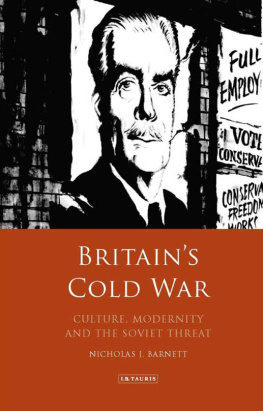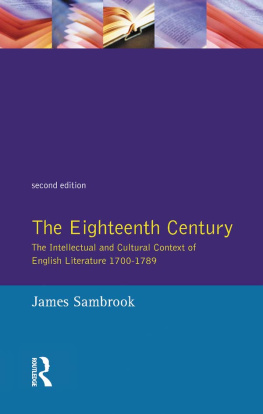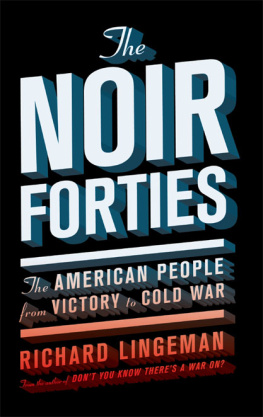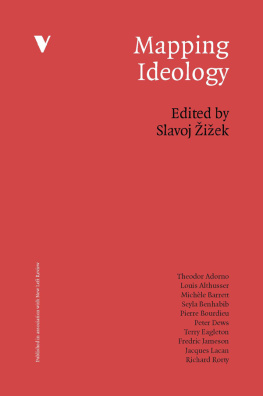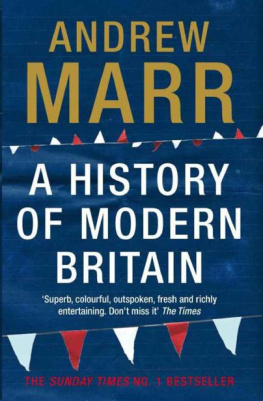Jim Smyth is Professor of History at the University of Notre Dame. He is a specialist in British and Irish history and his publications include The Making of the United Kingdom 16601800: State, Religion and Identity in Britain and Ireland and The Men of No Property: Irish Radicals and Popular Politics in the Late Eighteenth Century.
Cold War Culture
Intellectuals, the Media and the Practice of History
Jim Smyth
Published in 2016 by
I.B.Tauris & Co. Ltd
London New York
www.ibtauris.com
Copyright 2016 Jim Smyth
The right of Jim Smyth to be identified as the author of this work has been asserted by the author in accordance with the Copyright, Designs and Patents Act 1988.
All rights reserved. Except for brief quotations in a review, this book, or any part thereof, may not be reproduced, stored in or introduced into a retrieval system, or transmitted, in any form or by any means, electronic, mechanical, photocopying, recording or otherwise, without the prior written permission of the publisher.
Every attempt has been made to gain permission for the use of the images in this book. Any omissions will be rectified in future editions.
References to websites were correct at the time of writing.
The publishers gratefully acknowledge the support of the Institute for Scholarship in the Liberal Arts (ISLA) at the University of Notre Dame and their help in making this publication possible.
ISBN: 978 1 78453 112 6
eISBN: 978 0 85772 916 3
ePDF: 978 0 85772 711 4
A full CIP record for this book is available from the British Library
A full CIP record is available from the Library of Congress
Library of Congress Catalog Card Number: available
Typeset by Out of House
Printed and bound by CPI Group (UK) Ltd, Croydon, CR0 4YY
Contents
Illustrations
Acknowledgements
I wish to thank the Earhart Foundation for the award of a fellowship which enabled me to finish the research for, and begin the writing of, this book (I thank them also for corresponding by snail mail); and the Institute for Scholarship in the Liberal Arts, College of Arts and Letters, University of Notre Dame, for its support towards publication.
Generously, Terry Eagleton, John Kelly, Alasdair MacIntyre, Tony Shaw and (as ever) Jonathan Steinberg read and commented on various chapters: any errors or infelicities which may linger in the text are solely mine. I have benefited immensely from the intellectual enrichment and logistical support of my friends and colleagues in the history department and in the Keough-Naughton Institute for Irish Studies in the University of Notre Dame particularly Chris Fox, Patrick Griffin, and Peter McQuillan. My fellow historians, Tom Bartlett, Ciaran Brady, Vincent Carey, Joe Lee, Ian MacBride, Breandan MacSuibhne, and mo Ghile Mear, the much missed Breandn Buachalla, Margaret OCallaghan, amonn Ciardha, Ruan ODonnell and (honorary historian) Ray Ryan have all supplied the most stimulating of company. Finally I wish to acknowledge the saintly patience of my former and current graduate students Gavin Foster, Aaron Willis, Keelin Burke and Jess Lumsden who heard much more about Lewis Namier and Herbert Butterfield than they were prepared for, which was not at all.
Abbreviations
| CCF | Congress for Cultural Freedom |
| CPHG | Communist Party Historians Group |
| CUL BP | Cambridge University Library, Butterfield Papers |
| IRD | Information Research Department |
| KCL, LHCMA | Kings College, London, Liddell Hart Centre for Military Archives |
| NR | New Reasoner |
| ODNB | Oxford Dictionary of National Biography |
| TLS | Times Literary Supplement |
| UCD | University College, Dublin (Archive) |
| U&LR | Universities and Left Review |
Introduction
How do you get from Ireland in the 1790s to Britain in the 1950s? An explanation
This book has its origins in an intended biography of the historian of eighteenth-century British politics, Sir Lewis Namier, in whom I was interested for mainly negative reasons. My first historical work traced popular politicization in Ireland in the 1790s, or, put another way, it dealt with the content and dissemination of political ideas and their impact upon political mobilization and action.
Clearly the history of parliament and of elites is as valuable as the history of Painite revolutionaries, and the detailed, high-precision and enduring quality of Namierite scholarship cannot be gainsaid. The problem, it seemed to me, lay with its assumptions about how politics actually worked. Namierland is inhabited by politicians who are devoid, except at a trivial rhetorical level, of political principle; untouched by public opinion, they are driven rather by the frank pursuit of patronage and preferment. From the standpoint of history from below, or from the streets of west Belfast where I grew up during the Troubles, such discounting of political ideology as a factor in political behaviour appears cavalier, wrong-headed and reductive.
Namier burnt his papers shortly before his death and as my doubts as to the viability of writing a full-dress biography mounted, new questions pointing in new directions persisted in presenting themselves. Why did Namiers reputation reach such heights in the 1950s? As Noel Annan, chronicler in Our Age of the great and the good who ran the country at that time, recalled, Namier obsessed us, even after his death. The rise and decline of the Namier School may be in part explained by developments within historiography, the impact of Herbert Butterfields dissenting George III and the Historians (1957), for example. Historians, however, contextualize everything, including each other. What were the cultural, intellectual, social and political frameworks within which historians wrote and argued in the 1950s? What did they assume? Attempting to answer these questions thus turned a projected biography of Namier into a study of British intellectuals (including prominently Namier himself) in a Cold War climate.
But first, some cautionary tales. Perhaps the best-known advice on the need to contextualize historical writing is E.H. Carrs injunction, delivered in What is History? (1961): before you study the history, study the historian [] before you study the historian, study his historical and social environment. The historian, being an individual, is also a product of history and of society.
Such detail signals the pitfalls and seductions of automatic contextualizing, and the importance to the writing of history of personality, individual experience, professional socialization, the inner dynamics of scholarly discourse and, not least, of accident. But Carr, in my view, and on balance, got it right. No historian or other intellectual can ever completely escape the conditions and presuppositions of his time and place. British historians of the 1950s lived in Britain in the 1950s.
(A note. Sometimes it may appear in what follows that I use Britain and British interchangeably with England and English. In fact, as a practitioner of the new British history, I am keenly aware of the distinction, thus when I write English when strictly it should be British, I do so deliberately, based on a judgement, in each instance, that English better conveys what I mean to say.)

